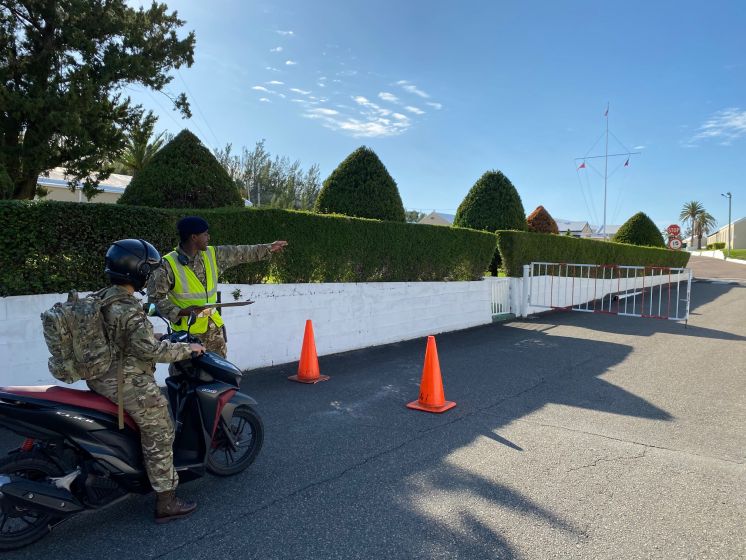Regiment Troops Kitted Up For COVID-19
Soldiers in the front line of the battle against Covid-19 are equipped to do the job, senior officers said yesterday.
Major Preston Gill, the RBR coronavirus response commander and planner, added that troops had been ordered to follow strict guidelines and were issued with protective equipment up to the level of risk faced.
He said: “Everyone has the right kit to do their jobs. We have been clear to our soldiers that they will be issued personal protective equipment and instructed when to wear it during the operation.”
Maj. Gill added: “Our soldiers will only wear masks if they have symptoms or they are in direct contact with someone with symptoms or who has tested positive for Covid-19, which is in line with expert guidelines.
“We trust the advice of the Chief Medical Officer and her staff to ensure that we maintain the trust of the soldiers under our command.”
Personal protective equipment available includes gloves, masks, respirators and hazmat suits.
RBR soldiers have been involved in helping the police service at community advisory points and the transport of suspected or confirmed Covid-19 cases.
Some soldiers have also stepped up to drive public transport buses to get essential staff to and from work at the King Edward VII Memorial Hospital after normal services were suspended, with back up from other troops to ensure the right people are on board.
Major Basil Wilson, an RBR medical officer, said: “The medics and the Regiment follow the guidelines from the Department of Health and Centers for Disease Control - social distancing at two metres and use of personal protective equipment as needed in their interaction with the public, their families and each other.
“All are screened on entrance to Warwick Camp and the soldiers that will rotate into camp will also be screened. The Regimental medical officers are in communication with the CO and medics as needed.”
RBR Commanding Officer Maj. Ben Beasley said: “Whatever the ask, the Regiment is duty bound to provide that key support – but the health and safety of our soldiers is well planned, well executed and always aware of the risk to our soldiers.
“That is not to say that how the Regiment trains and operates is without risk.
“People only look at footage of our hurricane response over the years, at home and abroad, to see that the work we do is dangerous.”
But Maj. Beasley said: “Notwithstanding the onslaught of information - and often misinformation - social media platforms around the world, the RBR operates under the guidelines of the World Health Organisation, the Ministry of Health, as well as RBR doctors and medics.
He added that Captain Paolo Odoli, the deputy coronavirus planner and liaison officer, on Monday delivered a refresher course on health and safety to the 60-plus troops embodied for the coronavirus crisis.
He said that the briefing included facts on what the virus was, symptoms and how, as well as how not, it could be contracted.
Captain Odoli said, “Information is another form of ammunition and we ensure that our troops are well-armed.”
The Ministry of Health and the wider Government notices provides some very straightforward directions on how to protect against infection. Washing hands and social distancing feature in most of not every health advisory.
Captain Odoli added that guidelines on regular hand-washing and social distancing were orders in the RBR and soldiers had to obey them.
Maj. Beasley said: “We are pleased that none of the members of our COVID response team have presented symptoms or required testing to date.
“We are not naïve enough to believe that it is impossible, but I feel very confident in the protocols enforced at Warwick Camp.
“Everyone from the Commanding Officer down to private soldiers has to be screened for fever and answer questions about whether or not they believe they have been exposed.
“We take the health and safety of our soldiers very seriously, not only as an extension of general concern for their wellbeing but as part of our duty to maintain operational effectiveness.”
Maj. Beasley added that soldiers embodied for two weeks would soon be rotated out and replaced with fresh troops to maintain efficiency and give soldiers who have been on duty a chance to see their families.







